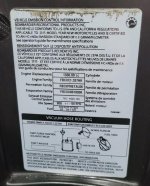Woodenfish
Active member
The last vehicle I purchased new that regular gas was recommended by the manufacturer was in 1998 and I owned that car for only 3 years. Everything else since has been premium fuel. Everything I purchased since was either turbocharged or the Spyders with 12.5:1 compression ratio. When my wife and I go out riding we are on two Spyders and between the fuel costs, tolls and everything else it would be much cheaper driving together in our car. These machines eat money but they weren’t purchased for being economical.

